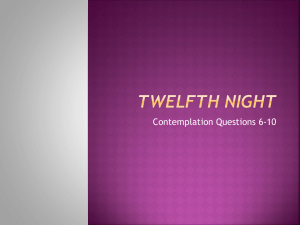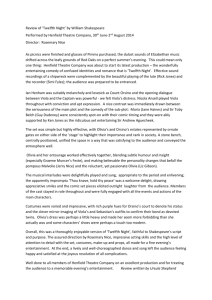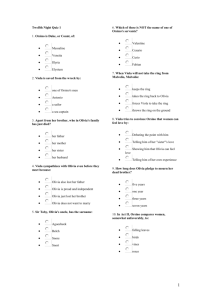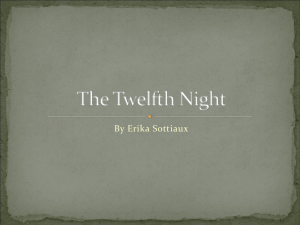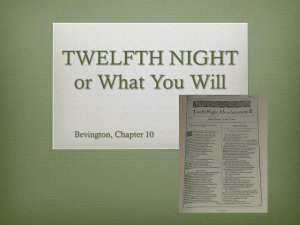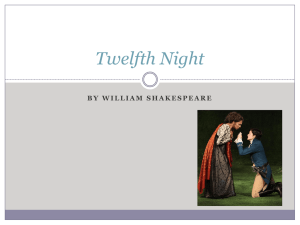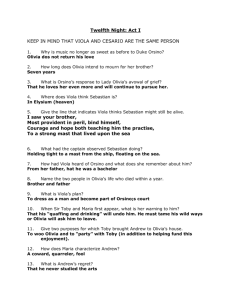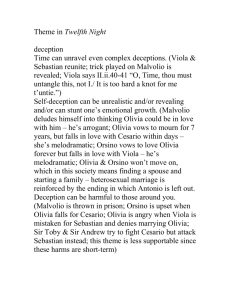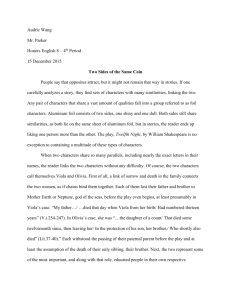Twelfth Night
advertisement
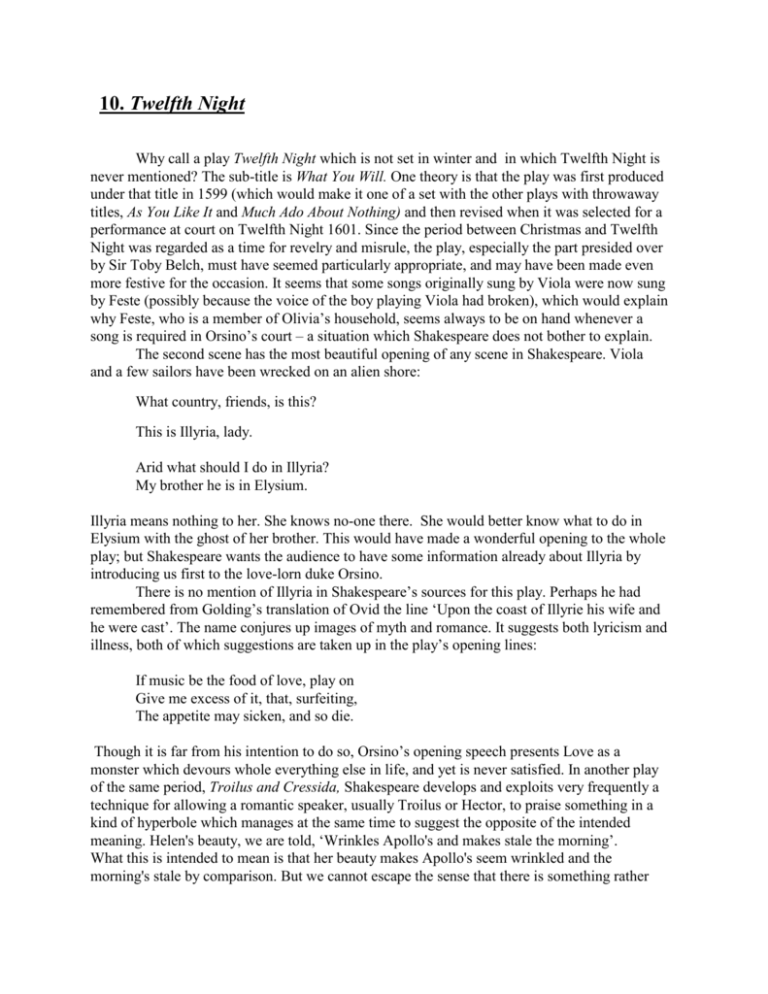
10. Twelfth Night Why call a play Twelfth Night which is not set in winter and in which Twelfth Night is never mentioned? The sub-title is What You Will. One theory is that the play was first produced under that title in 1599 (which would make it one of a set with the other plays with throwaway titles, As You Like It and Much Ado About Nothing) and then revised when it was selected for a performance at court on Twelfth Night 1601. Since the period between Christmas and Twelfth Night was regarded as a time for revelry and misrule, the play, especially the part presided over by Sir Toby Belch, must have seemed particularly appropriate, and may have been made even more festive for the occasion. It seems that some songs originally sung by Viola were now sung by Feste (possibly because the voice of the boy playing Viola had broken), which would explain why Feste, who is a member of Olivia’s household, seems always to be on hand whenever a song is required in Orsino’s court – a situation which Shakespeare does not bother to explain. The second scene has the most beautiful opening of any scene in Shakespeare. Viola and a few sailors have been wrecked on an alien shore: What country, friends, is this? This is Illyria, lady. Arid what should I do in Illyria? My brother he is in Elysium. Illyria means nothing to her. She knows no-one there. She would better know what to do in Elysium with the ghost of her brother. This would have made a wonderful opening to the whole play; but Shakespeare wants the audience to have some information already about Illyria by introducing us first to the love-lorn duke Orsino. There is no mention of Illyria in Shakespeare’s sources for this play. Perhaps he had remembered from Golding’s translation of Ovid the line ‘Upon the coast of Illyrie his wife and he were cast’. The name conjures up images of myth and romance. It suggests both lyricism and illness, both of which suggestions are taken up in the play’s opening lines: If music be the food of love, play on Give me excess of it, that, surfeiting, The appetite may sicken, and so die. Though it is far from his intention to do so, Orsino’s opening speech presents Love as a monster which devours whole everything else in life, and yet is never satisfied. In another play of the same period, Troilus and Cressida, Shakespeare develops and exploits very frequently a technique for allowing a romantic speaker, usually Troilus or Hector, to praise something in a kind of hyperbole which manages at the same time to suggest the opposite of the intended meaning. Helen's beauty, we are told, ‘Wrinkles Apollo's and makes stale the morning’. What this is intended to mean is that her beauty makes Apollo's seem wrinkled and the morning's stale by comparison. But we cannot escape the sense that there is something rather degrading, corrupting even, in Helen's beauty, that actually infects all it touches. The same technique is surely being used here, in a more subtle and gentle form, as befits a genial comedy: Nought enters there [the spirit of love] Of what validity and pitch soe'er But falls into abatement and low price Even in a minute. This is intended as praise of love, in comparison with which all else seems worthless. But can we escape the suggestion that even the most true, valuable and important things in life are swallowed by this cormorant love, and devalued. The Duke is later to claim that it is characteristic of love to kill ‘the flock of all affections else’. The Duke seeks always new fuel for his melancholy, which he obviously enjoys, first an excess, a surfeit of music, preferably music with a ‘dying fall’; then an equally cloying indulgence in flowers: Away before me to sweet beds of flowers Love-thoughts lie rich when canopied with bowers. 0 The Duke is posturing almost as absurdly as Malvolio before his looking glass, squeezing every last drop out of the situation (since otherwise he would die of boredom) – in love with the idea of love rather than any real woman, and a highly suspect love at that. Olivia, in the vignette we are given of her here, is hardly less preposterous: The element itself, till seven years’ heat Shall not behold her face at ample view; But like a cloistress she will veiled walk, And water once a day her chamber round With eye-offending brine: all this to season A brother’s dead love. [I.i.26-31] The word ‘season’ alerts us to the self-indulgence, and the brother’s dead love is to be forgotten as soon as a living love enters her life. She falsifies grief as much as Orsino falsifies love, turning it into a self-regarding pose, squeezing out daily tears in order to cut a romantically impressive and moving figure of sorrow and constancy, in imitation of her heroine Lucrece (who is pictured on her seal). Shakespeare, in common with St. Augustine, Tyndale, and other moralists, took Lucrece to be an example not of a perfect woman, but of one who turned a genuine wrong against her (her rape by Tarquin) into an excuse for a false martyrdom – a martyrdom aimed solely at name and fame rather than real purity or concern for others (such as her husband and children), or for God. Olivia and Orsino are alike in that their behaviour is excessive, disproportionate, self-regarding, immature. And Illyria, at the outset, is defined for us by these two. The beautiful cadence of Viola’s opening lines and their pathos must not distract us from their import. What, indeed, should she do in Illyria? Not, one hopes, do as the Illyrians do. The word Illyria also suggests illusion. What others do in Illyria (we find it in Malvolio and Sir Andrew as well as Orsino and Olivia) is to disguise their true selves, even from themselves, under affectation. Viola is obliged to disguise herself, not out of affectation, but in order to survive. What she does not do, despite the genuineness of her distress on his account, is to vow to mourn her brother for seven years in cloistered and sterile seclusion. Instead she turns her sharp mind to the practical problems of survival, and within moments she has worked out exactly what she should do in Illyria. She cannot, of course, control the heart's affections - that she should fall in love with the Duke, and Olivia with her. The fact that Viola must wear the most lying disguise of all, and must play out the charade of declaring the love of the man she loves to the woman who loves her, allows for the most complex ironies, ironies as often poignant as comic. Dr, Johnson wrote that The marriage of' Olivia, and the succeeding perplexity, though well enough contrived to divert on the stage, wants credibility, and fails to produce the proper instruction required in the drama, as it exhibits no just picture of life. But it is precisely Shakespeare’s point that life in Illyria is not a ‘just picture’. Illyria is a land of illusion. As the clowri says: 'Nothing that is so, is so'. Sebastian asks: ' Are all the people mad? Or I am mad or else this is a dream'; and later: ' I am mad, Or else the lady' s mad. There' s something in't that is deceivable’. Olivia says (speaking of Malvolio): 'I am as mad as he'. Viola, speaking of Antonio, says: ' I know riot what ' twas, but distraction' . The Duke says to Antonio: ' Thy words are madness', and on seeing Viola and Sebastian together for the first time says: ‘A natural perspective, that is, and is not’. This ‘madness’ is all of a kind, a failure to be able to distinguish the real from the counterfeit. The theme of' madness, therefore, shades off into the theme of disguise. Viola has a 'free and open disposition' in a world of seeming. The irony is that she is the only one in deliberate disguise: Conceal me what I am, and be my aid For such disguise as haply shall become The form of my intent. Olivia is accurate in her diagnosis of Malvolio: 0, you are sick of self-love, Malvolio, and taste with a distempered appetite. To be generous, guiltless, and of free disposition is to take those things for bird-bolts that you deem cannonbullets. But Malvolio is by no means the only Illyrian sick of self-love. Viola is shortly to say to Olivia herself: ‘I see you what you are, you are too proud’, and later: 'you do think you are not what you are'. None of the Illyrians think they are what they are. Viola is in disguise from others, the Illyrians from themselves. *** The holiday spirit of the play means that the energies which normally go into duties and formal observances and inhibitions are released for more spontaneous, natural and pleasurable purposes. Sir Tobv's question: ‘Because thou are virtuous, shall there be no more cakes and ale?’ seems unanswerable. In holiday terms it is unanswerable. Malvolio is the skeleton at the feast - the one man who is too proud to ‘let the world slip’ or let his dignity and self-love slip so as to be able to partake of the life-giving release of creative energies which the ending of a festive comedy invariably celebrates. Malvolio is the only one not included in the general reconciliation and pairing off at the end - he stalks off vowing to be revenged on the lot of them, as forty years later he was, in his reincarnation as Crornwel1 . Yet we can hardly accept Sir Toby as a fit judge of Malvolio or anyone else. His values seem not to extend beyond cakes and ale. He stands for permanent holiday, making misrule the rule. Malvolio, though blind to his own defects, is accurate in his criticism of others. Of Sir Toby and Sir Andrew he says: My masters, are you mad? Or what are you? Have you no wit, manners, nor honesty, but to gabble like tinkers at this time of night? … Is there no respect of place, persons, nor time in you? Malvolio's rigidity will not allow him to experience the freedom of holiday. Sir Toby and Sir Andrew insist on living as if life were nothing but holiday. ‘Not to be abed before midnight is to be up betimes’ says Toby, and ‘I am sure care's an enemy of life’. These values are well enough for holiday, but we saw in Sir John Falstaff what corruption they lead to when applied to everyday, and to the serious and important business of living. Malvolio and Sir Toby are opposites, each failing in opposite ways to be a complete and self-responsible human being. The standard for that is set by Viola. Illyria is a world of beautiful fantasy, at odds with the low and callous realism of Sir Toby. It offers, until the arrival of Viola, a choice between false values and no values. Orsino and Olivia pretend to live in a world without Agues and Belches. They are as self-indulgent in their affectation of excessive virtue as Sir Toby in his consumption of cakes and ale. The Duke spurns that love which 'may be called appetite'; but his language betrays that he can think of love in no other terms than grossly inflated appetite: But mine is all as hungry as the sea, And can digest as much. Each is a solipsist, incapable of a true relationship, which means the dropping of disguises. So far is Orsino from having or truly desiring a relationship with Olivia that he can court her by proxy, and receive her repeated refusals as more fuel for his insatiable melancholy. By standards of normality, health and sanity brought in from the outside by Viola and Sebastian and Antonio, they are all mad. The role of these outsiders is to bring into this decadent, dreamlike world the clear air and sunlight of the natural, the spontaneous, the true, the achievable, the fully aware and responsible. Whereas the disguises of the Illyrians commit them to false living, prevent self-knowledge; Viola's does not. On the contrary, it licences her to speak the truth to Olivia. At her first visit as Cesario she begins by mocking the artificiality of the speech she has been sent to make, and she is shortly to tell Olivia: ‘I see you what you are; you are too proud’. Since this is a comedy, Orsino and Olivia are assumed to be capable of change (as Malviolio is not) and of releasing the capacity for true loving never too far below the affected disguise. Let us look at the famous scene where Viola first, guardedly, speaks of her love to Orsino: My father had a daughter lov’d a man, As it might be perhaps, were I a woman, I should your lordship. And what’s her history? A blank, my lord: she never told her love, But let concealment like a worm i’ th’ bud Feed on her damask cheek: she pin’d in thought, And with a green and yellow melancholy She sat like Patience on a monument, Smiling at grief. Was not this love indeed? We men may say more, swear more, but indeed Our shows are more than will: for still we prove Much in our vows, but little in our love. But died thy sister of her love, my boy? I am all the daughters of my father’s house, And all the brothers too: and yet I know not. Beautiful as Viola's speech is here, and effective in drawing Orsino's attention, for the first time in the play, to someone other than himself, we must register the similarity between the woman in Viola's story and Olivia, who has also erected her grief into a monument and is encouraging it to gnaw at her youth like a worm i’ the bud. The imagined woman is well enough as a debating point, but if she were real, if she were indeed Viola, she would be a sad case, her pointless silence, or silence motivated by affected virtue and fear of life, making her history a blank. Viola's language betrays her own judgement of such a history - the worm in the bud, the pining, the sterile, sickly green and yellow melancholy... The very telling of the story is Viola's first oblique attempt to speak her love, the first of many such attempts. When finally her disguise is off, the Duke says: Boy, thou hast said to me a thousand times Thou never shouldst love woman like to me. and Viola speaks out freely: And all those sayings will I overswear, And all those swearings keen as true in soul As doth that orbed continent the fire That severs day from night. She and her brother serve indeed to bring fresh air and bright sunlight into the shadowy dream-world of Illyria. It is the down-to-earth realism and directness of Cesario that Olivia first responds to. Her saving grace is that she is able to throw affectation and prudence to the winds when she sees the chance of a good husband. She is capable of risking humiliation, and of giving herself without any guarantee of an answering love: Cesario, by the roses of the spring, By maidenhood, honour, truth, and everything, I love thee so that, maugre all thy pride, Nor wit nor reason can my passion hide. Do not extort thy reasons from this clause, For that I woo, thou therefore hast no cause; But rather reason thus with reason fetter, Love sought is good, but given unsought is better. In the centre of the play the so-called sub-plot seems almost to take over. But so deftly are the two plots integrated, that we can hardly call the gulling of Malvolio by Sir Toby, Sir Andrew, Maria, Fabian and Feste a sub-plot at all. Our interest in this play is hardly in its story line, and thematically the broader comedy is only a caricature of the themes of the main plot. Sir Toby is the Lord of Misrule who presided over the revelry between Christmas and Twelfth Night. This was a strongly pagan festival which the Puritans sought to suppress. Its purpose was to take the lid off society for twelve days, to allow the usual rules, roles, order, to be questioned, mocked and overturned. Shakespeare's festive comedies are as it were licensed, as a licensed jester could speak home truths, to uncover and bring to book pomposity, affectation, hypocrisy. They are all holiday plays where anything goes - As You Like It, What You Will. What could be more appropriate than that the chief butt of Sir Toby should be the spoilsport, the kill-joy Malvolio, who would put down the revels if he could. Indeed his dream is to be become master of Olivia's heart and house for that very purpose. Orsino, Olivia and Malvolio are all ‘sick of self-love’. The egotism of each manifests itself in ‘brain-sick fancies’ - love fancies in Orsino who casts himself in the role of great lover and admires himself in the glass of his self-regard; Olivia fancying herself the very image of sorrow, chastity and devotion; Malvolio in love with the image of himself, even cross-gartered, transfigured and elevated by his mistress' love and hand: If Illyria is a rather sick dream, the golden age of clear air and sunshine, sanity, health and happiness, naturalness and harmony (all these things, as always, symbolized by marriage) is also a dream - a dream of what life ought to be like. Shakespeare knows full well that life is like that only within the conventions of a festive comedy. Those conventions were perhaps, by 1600, wearing a little thin for him. Jaques in As You Like It had already refused to be part of it. Now Malvolio refuses to enter it, but nurses his revenges, his ‘evil wishes’; and Shakespeare at the very end puts this holiday sunshine back into the context of the real world where it seems rather that ‘the rain it raineth every dav’. Twelfth Night is the last of the festive comedies. Shakespeare has already begun his tragedies. When eventually he returns to comedy, it will be of an altogether darker hue, [© Keith Sagar 2001. This essay may be quoted with due acknowledgement.]
